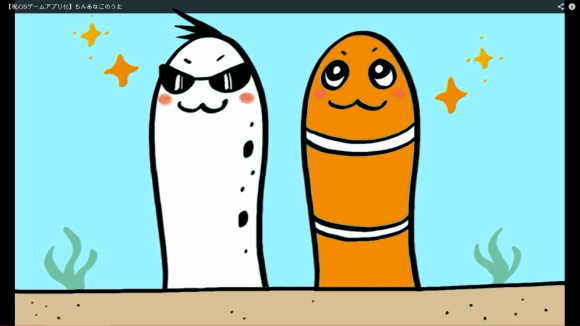
Japan cranks out a huge number of corporate and regional mascot characters, and each one is required to be cute, right down to its name. Unfortunately, sometimes a moniker that sounds perfectly fine in Japanese doesn’t have quite the same inoffensive ring to it in English.
Of course, naming choices can have unfortunate implications for Japanese speakers as well, like with Akita Prefecture’s cute little garden eel character called Chinanabo. In Chinanabo’s case, however, there’s enough evidence to make us think his creators are in on the joke.
For most people, eels occupy a rung between fruit bats and tarantulas on the cuteness ladder. Garden eels are a unique breed, though. Lacking the protruding teeth and electric powers of their more fearsome brethren, garden eels are tiny little guys who feed on plankton. They’re as intimidating as an unmowed patch of grass, and only slightly more active, as they spend their waking hours half-buried in the ocean floor, swaying gently in the current and munching on plankton that drifts by.
With so many of the traditionally cute animals already represented (Hello Kitty for cats, Rilakkuma for bears), Akita-based musician Junya Watanabe and illustrator Ai Iseki decided to create a song and animated music video about garden eels. Watanabe whipped up two designs, the spotted Mohichin, and the stripped Nisshi. But what to collectively call the duo?
In Japanese, garden eels are called chinanago, a combination of “unusual” (chin) and “sea eel” (anago). Watanabe and Iseki decided to play around with the term a little and settled on calling their characters Chinanabo.
There’s no way to sugarcoat what makes the name Chinanabo so shocking in Japanese, so at this point our more sensitive readers may wish to instead look at some adorable cat photos.
Still here? OK, then it’s time to tell you that Chinanabo’s name is a triple-layered joke revolving around the Japanese word for wiener.
▼ As in the kind you put condoms on, rather than condiments
Chinchin is a Japanese slang word for every guy’s most treasured part of his own body. So right off the bat, Chinanabo is a name that will cause a giggle fit in 70 percent of elementary school students (and 90 percent of RocketNews24 writers).
Moving along, shortening anago down to just ana turns it into the Japanese word for “hole,” so now we’ve got not just a penis joke, but a urethra joke, too.
But Watanabe and Iseki weren’t quite done ramming the joke down people’s throats just yet. For added measure, they stuck bo at the end. Bo, when written with the kanji character 坊, is a pretty common add-on to nicknames that means something like “little” or “kid.” However, Chinanabo’s bo is written with the character 棒, which means rod.
▼ Again, the kind that makes babies, not soft rock albums
Totally obliterating any chance Chinanabo’s creators had of claiming this is all unintentional are the lyrics to Garden Eel Song.
Things start out wholesomely enough, with lines about the garden eel poking its head out in search of some tasty plankton.
And then we come to the chorus:
“Chin, chin! Chinanago! Chin chin chin chin, Chinanago!”
Or, alternatively,
“Wiener! Garden eel! Wiener wiener, garden eel!”
Surprisingly, it seems executives at established Japanese toy maker Takara Tomy are looking to get into the phallic-shaped plush toy market, and have licensed the characters in order to produce a pair of Chinanabo hand puppets which go on sale December 27 for 1,344 yen (US$13.70).
You know something? Maybe we’ve been too harsh in our judgment. After all, with a respected mainstream company like Takara Tomy on board, maybe Chinanabo isn’t just an extended schlong joke. We are curious about that trigger on the handle though. What happens when you squeeze it?
▼ “Boing!”
Schlong joke it is, then.
Sources: Byokan Sunday, Akita Keizai Shimbun
Top image: YouTube
Insert images: Sumida Aquarium, YouTube, McDonald’s Japan, CD Journal, Akita Keizai Shimbun, Twitter

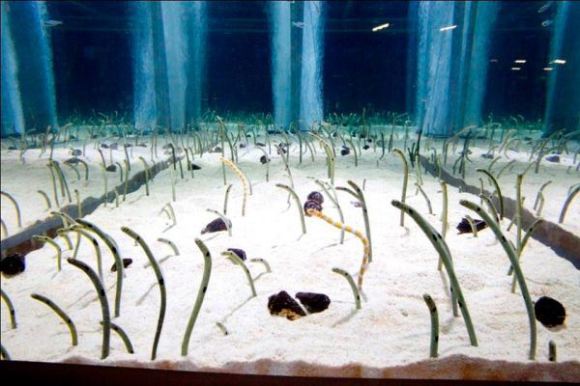
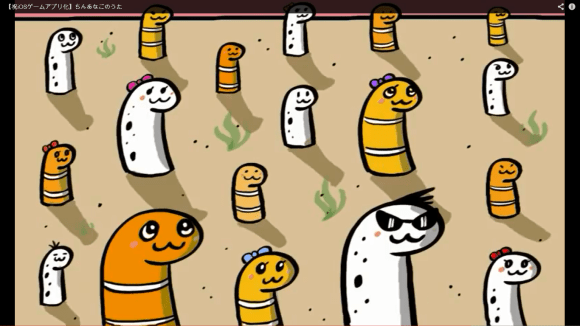


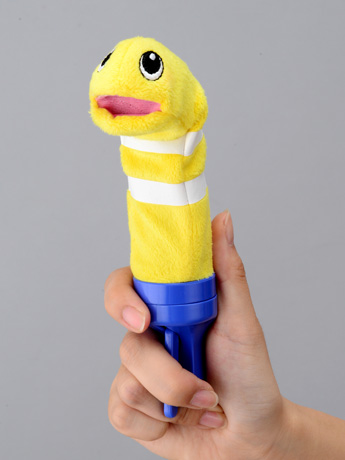
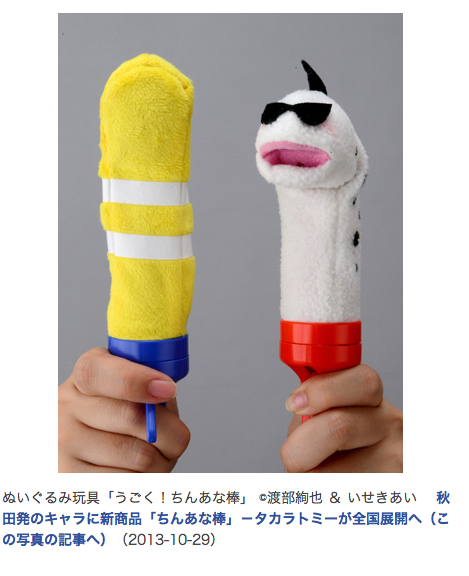
 Garden eels in Japanese aquarium are forgetting humans and need your help!
Garden eels in Japanese aquarium are forgetting humans and need your help! Which Japanese conveyor belt sushi chain has the best saltwater eel sushi?【Taste test】
Which Japanese conveyor belt sushi chain has the best saltwater eel sushi?【Taste test】 What’s it like to eat eel from a Japanese vending machine?
What’s it like to eat eel from a Japanese vending machine? We make an easy, cheap variation of an Eel Kabayaki Bowl that’s also vegetarian!【SoraKitchen】
We make an easy, cheap variation of an Eel Kabayaki Bowl that’s also vegetarian!【SoraKitchen】 Miniature version of the real-world Pikachu-shaped Pokémon bus is the newest Dream Tomica car
Miniature version of the real-world Pikachu-shaped Pokémon bus is the newest Dream Tomica car Beautiful Red and Blue Star luxury trains set to be Japan’s new Hokkaido travel stars
Beautiful Red and Blue Star luxury trains set to be Japan’s new Hokkaido travel stars Red light district sushi restaurant in Tokyo shows us just how wrong we were about it
Red light district sushi restaurant in Tokyo shows us just how wrong we were about it Tokyo Tsukiji fish market site to be redeveloped with 50,000-seat stadium, hotel, shopping center
Tokyo Tsukiji fish market site to be redeveloped with 50,000-seat stadium, hotel, shopping center Historical figures get manga makeovers from artists of Spy x Family, My Hero Academia and more
Historical figures get manga makeovers from artists of Spy x Family, My Hero Academia and more French Fries Bread in Tokyo’s Shibuya becomes a hit on social media
French Fries Bread in Tokyo’s Shibuya becomes a hit on social media Sandwiches fit for a sumo served up in Osaka【Taste Test】
Sandwiches fit for a sumo served up in Osaka【Taste Test】 Japanese ramen restaurants under pressure from new yen banknotes
Japanese ramen restaurants under pressure from new yen banknotes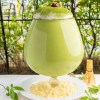 Japan’s massive matcha parfait weighs 6 kilos, contains hidden surprises for anyone who eats it
Japan’s massive matcha parfait weighs 6 kilos, contains hidden surprises for anyone who eats it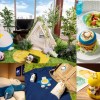 Pokémon Sleep camping suite and guestrooms coming to Tokyo Hyatt along with giant Snorlax burgers
Pokémon Sleep camping suite and guestrooms coming to Tokyo Hyatt along with giant Snorlax burgers Limited-edition Carbonara Udon will anger noodle purists and pasta lovers 【Taste test】
Limited-edition Carbonara Udon will anger noodle purists and pasta lovers 【Taste test】 McDonald’s new Happy Meals offer up cute and practical Sanrio lifestyle goods
McDonald’s new Happy Meals offer up cute and practical Sanrio lifestyle goods All-you-can-drink Starbucks and amazing views part of Tokyo’s new 170 meter-high sky lounge
All-you-can-drink Starbucks and amazing views part of Tokyo’s new 170 meter-high sky lounge Studio Ghibli releases new action figures featuring Nausicaä of the Valley of the Wind characters
Studio Ghibli releases new action figures featuring Nausicaä of the Valley of the Wind characters New private rooms on Tokaido Shinkansen change the way we travel from Tokyo to Kyoto
New private rooms on Tokaido Shinkansen change the way we travel from Tokyo to Kyoto Studio Ghibli glasses cases let anime characters keep an eye on your spectacles
Studio Ghibli glasses cases let anime characters keep an eye on your spectacles Beautiful Ghibli sealing wax kits let you create accessories and elegant letter decorations【Pics】
Beautiful Ghibli sealing wax kits let you create accessories and elegant letter decorations【Pics】 Studio Ghibli releases Kiki’s Delivery Service chocolate cake pouches in Japan
Studio Ghibli releases Kiki’s Delivery Service chocolate cake pouches in Japan New definition of “Japanese whiskey” goes into effect to prevent fakes from fooling overseas buyers
New definition of “Japanese whiskey” goes into effect to prevent fakes from fooling overseas buyers Our Japanese reporter visits Costco in the U.S., finds super American and very Japanese things
Our Japanese reporter visits Costco in the U.S., finds super American and very Japanese things Studio Ghibli unveils Mother’s Day gift set that captures the love in My Neighbour Totoro
Studio Ghibli unveils Mother’s Day gift set that captures the love in My Neighbour Totoro New Japanese KitKat flavour stars Sanrio characters, including Hello Kitty
New Japanese KitKat flavour stars Sanrio characters, including Hello Kitty More foreign tourists than ever before in history visited Japan last month
More foreign tourists than ever before in history visited Japan last month New Pokémon cakes let you eat your way through Pikachu and all the Eevee evolutions
New Pokémon cakes let you eat your way through Pikachu and all the Eevee evolutions Sales of Japan’s most convenient train ticket/shopping payment cards suspended indefinitely
Sales of Japan’s most convenient train ticket/shopping payment cards suspended indefinitely Sold-out Studio Ghibli desktop humidifiers are back so Totoro can help you through the dry season
Sold-out Studio Ghibli desktop humidifiers are back so Totoro can help you through the dry season Japanese government to make first change to romanization spelling rules since the 1950s
Japanese government to make first change to romanization spelling rules since the 1950s Ghibli founders Toshio Suzuki and Hayao Miyazaki contribute to Japanese whisky Totoro label design
Ghibli founders Toshio Suzuki and Hayao Miyazaki contribute to Japanese whisky Totoro label design Doraemon found buried at sea as scene from 1993 anime becomes real life【Photos】
Doraemon found buried at sea as scene from 1993 anime becomes real life【Photos】 Tokyo’s most famous Starbucks is closed
Tokyo’s most famous Starbucks is closed One Piece characters’ nationalities revealed, but fans have mixed opinions
One Piece characters’ nationalities revealed, but fans have mixed opinions We asked a Uniqlo employee what four things we should buy and their suggestions didn’t disappoint
We asked a Uniqlo employee what four things we should buy and their suggestions didn’t disappoint Princesses, fruits, and blacksmiths: Study reveals the 30 most unusual family names in Japan
Princesses, fruits, and blacksmiths: Study reveals the 30 most unusual family names in Japan Tokyo aquarium’s reopening showcases a revamped, ethereally beautiful jellyfish chamber
Tokyo aquarium’s reopening showcases a revamped, ethereally beautiful jellyfish chamber Decorative animal toys with massive chins now a thing in Japan for some reason
Decorative animal toys with massive chins now a thing in Japan for some reason Eel-topped takoyaki is delicious in any season, but here’s why now is the best time to try it
Eel-topped takoyaki is delicious in any season, but here’s why now is the best time to try it Eggslut adds a whole ass eel to a new sandwich in Japan
Eggslut adds a whole ass eel to a new sandwich in Japan Sure eel flavored potato chips are great, but here’s a recipe that’ll make them even better!
Sure eel flavored potato chips are great, but here’s a recipe that’ll make them even better! Man puts 50-centimeter live eel into anus to treat constipation, doesn’t go as planned
Man puts 50-centimeter live eel into anus to treat constipation, doesn’t go as planned Trying Family Mart’s Alternative Seafood Rice Bowl made with 5 imitation toppings【Taste test】
Trying Family Mart’s Alternative Seafood Rice Bowl made with 5 imitation toppings【Taste test】 New Pompompurin Cafe opens with exclusive Japanese dishes modeled after the Sanrio star 【Pics】
New Pompompurin Cafe opens with exclusive Japanese dishes modeled after the Sanrio star 【Pics】 How to pick out the best anago eel and other things we learned at the anago processing center
How to pick out the best anago eel and other things we learned at the anago processing center We try unagi cola with genuine eel extract 【Taste Test】
We try unagi cola with genuine eel extract 【Taste Test】 Spirited Away’s No Face pulls up as a car with newest Studio Ghibli Dream Tomica now on sale【Pics】
Spirited Away’s No Face pulls up as a car with newest Studio Ghibli Dream Tomica now on sale【Pics】 To eat or to play? Do both with a somen noodle slider from Japan!
To eat or to play? Do both with a somen noodle slider from Japan! Giant Clodsire Pokémon plushie comes with up to 32 Woopers in super size, super cute set【Pics】
Giant Clodsire Pokémon plushie comes with up to 32 Woopers in super size, super cute set【Pics】 “Electric Shock Warning! Electric shock Pikachu” released in Japan
“Electric Shock Warning! Electric shock Pikachu” released in Japan Dogs in Japan keep sticking their noses where they don’t belong, are adorable, Akita puppy shows
Dogs in Japan keep sticking their noses where they don’t belong, are adorable, Akita puppy shows
Leave a Reply